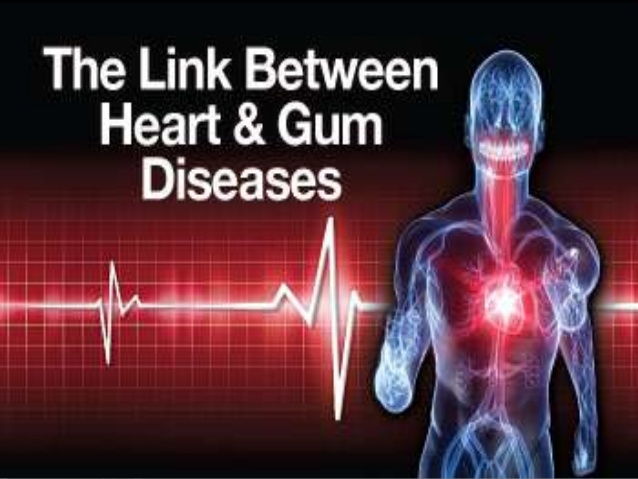There is a Heart Risk if you have chronic Gum Disease
Many of the risk factors for gum disease are the same as those for heart diseases, such as tobacco use, poor nutrition, and diabetes. Overall, people who have chronic gum disease are at higher risk for a heart attack, according to the Academy of General Dentistry (AGD). Gum disease (called gingivitis in its early stages and periodontal disease in the late stages) is caused by plaque buildup along and below the gum line. Some researchers have suggested that gum disease may contribute to heart disease because bacteria from infected gums can dislodge, enter the bloodstream, attach to blood vessels and increase clot formation. It has also been suggested that inflammation caused by gum disease may also trigger clot formation. Clots decrease blood flow to the heart, thereby causing an elevation in blood pressure and increasing the risk of a heart attack.
Research shows that many systemic diseases – including heart disease – have oral symptoms. Dentists can help patients who have a history of heart disease by examining them for any signs of oral pain, infection or inflammation. According to the AGD, proper diagnosis and treatment of tooth and gum infections in some of these patients have led to a decrease in blood pressure medications and improved overall health. If you currently have heart disease, make sure to tell your dentist about your condition as well as any medications you are currently taking. Remember to carefully follow your physician’s and dentist’s instructions about health care, and use any prescription medications, such as antibiotics, as directed.
 Warning signs
Warning signs
Gum disease affects 73.81% of adults in urban areas whereas in rural areas is as low as. 44.54% and often the condition goes undiagnosed. Warning signs that you may have gum disease include:
- Red, tender or swollen gums
- Bleeding gums while brushing or flossing
- Gums that seem to be pulling away from your teeth
- Chronic bad breath or a bad taste in your mouth
- Teeth that are loose or separating from each other
 Proactive prevention
Proactive prevention
While regular dental exams and cleanings are necessary to remove bacteria, plaque, and tartar and detect early signs of gum disease, you can play a major role in preventing gum disease every day. The best way to be proactive in maintaining your oral and overall health is scheduling regular dental checkups, getting professional cleanings and regular brushing and flossing. Taking steps to stop gum disease at the source is the best way to keep your smile beautiful at any age. Eat healthy and nutritious diet. Drink lots of water and engage less in the mouth to mouth interactions.
With healthy gums and perfect teeth, you will always find more reasons to smile….








